
Editor's Note: From June 5-8, 2024, the European Association for the Study of the Liver (EASL) Annual Meeting was held in the cultural city of Milan, Italy. This premier academic event attracted over 7,000 hepatology professionals from around the world. During the conference, we had the privilege of interviewing the Chairman of this year’s conference, and current EASL Secretary-General, Professor Aleksander Krag. He shared key topics of the conference and the latest research advancements in hepatology. Professor Krag emphasized that metabolic-associated fatty liver disease (MAFLD) has become the most widespread liver disease globally and highlighted the importance of drug development and policy cooperation in advancing liver disease treatment and management. He also discussed the challenges and future directions in liver disease research, encouraging collaboration and innovation in the field.Hepatology Digest: What key topics were chosen for discussion at this year’s EASL Annual Meeting, and what considerations guided these choices?
Professor Krag: This year, we selected several critical topics, including liver cancer, viral hepatitis, and the increasingly serious issue of MAFLD. Formerly known as non-alcoholic fatty liver disease (NAFLD), MAFLD has various causes, such as being overweight, fat degeneration, and type 2 diabetes. Given the global increase in overweight populations and significant progress in new drug development, we placed a particular focus on MAFLD. Additionally, we are paying attention to drug development and policy cooperation to drive advancements in liver disease treatment and management.
Hepatology Digest: What groundbreaking advancements have been made in hepatology research in recent years? How will these advancements impact the treatment and management of liver diseases?
Professor Krag: In viral hepatitis, the advent of direct-acting antivirals (DAAs) has made it possible to cure hepatitis C, and there has been significant progress in treating hepatitis B. Systemic therapies for liver cancer have also become increasingly diverse. Notably, the MAFLD field has seen the approval of the first therapeutic drug. Although currently available only in the United States, it heralds a new era in MAFLD treatment. These advancements will significantly propel liver disease treatment and management forward, offering new hope to patients.
Hepatology Digest: What are the main challenges currently facing hepatology research, and what do you think should be the future research directions and strategies?
Professor Krag: Hepatology research faces numerous challenges, with effectively treating MAFLD-related liver fibrosis being a significant one. Future research should focus more on fibrosis treatment, requiring a deeper understanding of its mechanisms. Additionally, the development of artificial intelligence will bring transformative changes to hepatology research. To achieve these goals, we need to unite more closely and collaborate across different sectors to advance liver disease research. We look forward to discussing these issues with our colleagues at EASL 2024 and contributing to the health of liver disease patients together.


